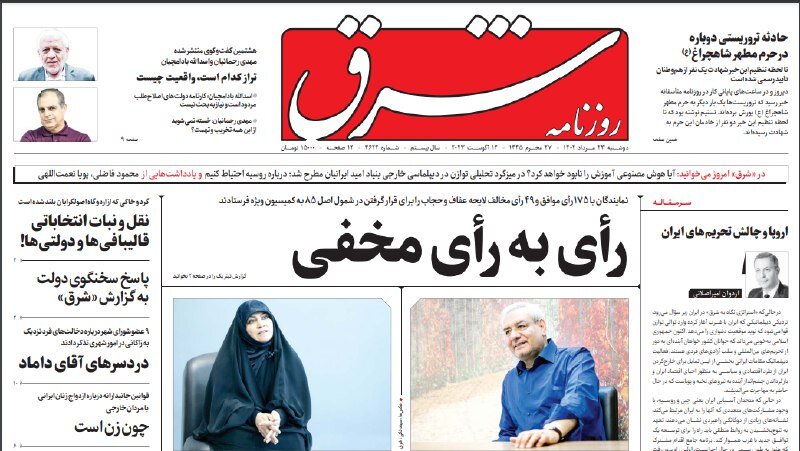Europe and the challenge of Iran sanctions

In its editorial, Shargh wrote: Iran is ready to slow down the progress of its nuclear program on the condition of cancellation of the main economic sanctions and releasing several billion dollars of Iran’s frozen assets abroad.
In such a situation, rumors about maintaining sanctions are definitely intended to distance Iran from Russia, especially at a time when the differences between the two allies are increasing. However, this strategy ignores the goals of Iran, which is now committed to diversifying its relationship. Getting closer to the West does not necessarily lead to breaking relations with Russia; therefore, if the countries signatory to the 2015 nuclear deal refuse to cancel the sanctions despite their obligations, the radical conservatives in Iran, who have no will to prevent the complete death of the JCPOA and oppose an alternative to it, will argue that Iran has been given waiver from all its obligations and therefore they will only continue their military programs. Finally, this issue will endanger Iran's diplomatic efforts with its neighbors in the Middle East; therefore, such a decision by the West can lead to renewed instability in the region.
Vatan-e-Emrooz: The story of the agreement
In a commentary, Vatan-e-Emrooz discussed the recent deal between Iran and the United States on prisoner exchange in return for the release of the Iranian frozen assets in South Korea. It said: Many political experts considered it unlikely to reach such an agreement due to the history of conflicts between the United States and Iran. In such an environment in which the foreign-based opponents made maximum use of the large-scale riots in the country to provoke America and the West to increase the sanctions or even take a military attack on our country, they suffered from the illusion that there is a zero chance that Iran could reach such a deal or get its rights from the West. Moreover, the United States thought that the whole world would unite with it in the company of Ukraine against Russia, and the political-media propaganda formed had a great impact on the determination of the United States to continue its nuclear talks with Iran. From the point of view of the Americans, Iran is now completely on the front against America and close to the Eastern front (China and Russia). Also, an important issue that is usually ignored in the analysis of recent events is that the process of implementing the JCPOA has reached the stage of lifting international missile and drone sanctions against Iran.
Iran: Behind the scenes of Washington's mischief to create conflict between Taliban and Tehran
In an analysis, the pro-government Iran newspaper wrote: Intensifying the dispute between Tehran and Kabul over the water share from the Helmand River will make the relationship between Iran and the Taliban more ambiguous and complicated. Although bringing the discussion about the dimensions of this relationship to the issue of water rights makes the situation quieter and visibility wider for observation and analysis, the reasons and variables involved in the ups and downs of the relationship between Iran and Afghanistan after the Taliban seized power took power in Afghanistan have made this process multi-dimensional. Washington is putting economic and security pressure on Kabul and seeks to misuse controversial issues, including Helmand's water rights, in order to create a crisis between Afghanistan and Iran. In a situation where Western countries with the help of the United Nations were trying to pursue the issue of Afghanistan through international channels, especially the United Nations Security Council, Iran succeeded in highlighting the issue of Afghanistan as a regional issue and launched the negotiation process of "Afghanistan's Neighbors".
Ham Mihan: Creating tension in Persian Gulf is not in the interest of America
In a note, Ham Mihan addressed the presence of American marines in the Persian Gulf. It wrote: A claim by Washington that Iran is causing disturbances to oil tankers passing through the Persian Gulf and the Strait of Hormuz has increased the possibility of a confrontation between Iranian and American ships in the region. In such an environment, Tehran and Washington may willingly or unwillingly move towards actions such as an exchange of fire. A review of historical events indicates that Iran does not welcome an increase in tension in the Persian Gulf and the Strait of Hormuz, but this issue, in addition to Tehran, seriously endangers the interests of the Arab countries bordering the Persian Gulf. It will also increase the level of tension between Beijing, as the largest importer of energy from the region, and the United States. Apparently, , Washington is trying to reduce its military presence in the Middle East and the Persian Gulf and focus on East Asia and China. So, basically, the question arises whether the president of the United States is aware of the consequences of this action.
